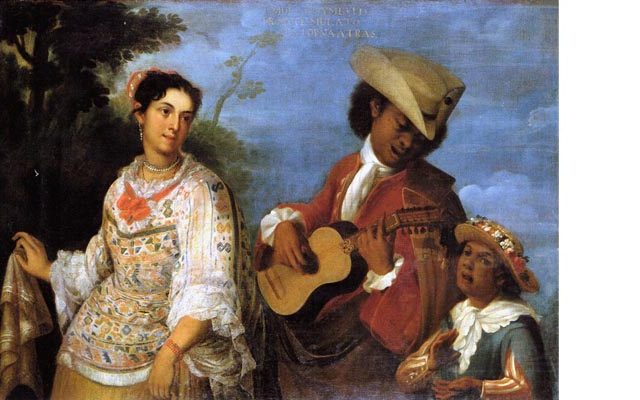
Date/Time
Friday, February 3, 2023
10:00 am PST – 5:30 pm PST
Location
UCLA William Andrews Clark Memorial Library
2520 Cimarron Street
–conference organized by Barbara Fuchs (University of California, Los Angeles) and Sarah Finley (Christopher Newport University)
This conference will be held in person at the Clark Library and livestreamed on the Center’s YouTube Channel. To attend the conference in person, you must register by submitting the booking form below. No registration is needed to watch the livestream.
This conference is free of charge. To attend the conference, you must reserve your space by submitting the booking form at the bottom of this page. Bookings open Thursday, January 5, 2023 and close Monday, January 30, 2023 at 5:00 p.m.
Face masks are not required but are strongly recommended at all indoor campus events.
Rooted in history, Atlantic studies has expanded to include scholarship on literature, intellectual exchange, material culture and more. Nevertheless, music remains marginalized within the field. In fact, Glenda Goodman remarked that it “remains conspicuously absent in studies of the cultural mixtures inherent to the Atlantic world.” She points to musicology’s relative isolation and the challenges of cross-disciplinary dialogue as barriers to more fully incorporating music into the paradigm. Sound studies’ interdisciplinarity is useful for addressing this lacuna. Inquiry into Atlantic-world auditory cultures will further debates in a field where notions of visual dominance and the orality/writing dichotomy often guide interpretations of cultural interactions. In response to this binarism, recent scholarship in early music has used untapped sources and new approaches to draw out previously marginalized voices in the Atlantic empires (Baker, Bloechl Native American, Irving and Tomlinson). Nevertheless, scholars argue for the subject’s continued expansion.
In response to these questions, “Approaches to Sound in the Early Modern Atlantic World” brings together scholars who grapple with the challenges of studying sound cultures in the Atlantic empires. Some strive to reconcile the apparent split between performance and the written archive. They examine accounts, scores, hymnals, biographical remnants and chronicles for evidence of musical or festival soundscapes in order to piece together the acoustical fabric of the past. Others seek to re-sound “lost” or marginalized voices in a more literal fashion, by reconstructing sonic archives or creating performances that engage the audience with the auditory experience and imagination of listeners in the early modern Atlantic.
Speakers
Olivia Bloechl, University of Pittsburgh
Jeroen Dewulf, University of California, Berkeley
Patrick M. Erben, University of West Georgia
Sarah Eyerly, Florida State University
Cesar Favila, University of California, Los Angeles
Sarah Finley, Christopher Newport University
Alejandro García Sudo, Independent Scholar
Sarah Grunnah, Independent Scholar/Theatre Practitioner
Paul Michael Johnson, DePauw University
Elisabeth Le Guin, University of California, Los Angeles
Mary Caton Lingold, Virginia Commonwealth University
Miguel A. Valerio, Washington University in St. Louis
Lisa Voigt, The Ohio State University
Program
Friday, February 3, 2023
9:30 a.m.
Morning Coffee and Registration
10:00 a.m.
Welcome and Introductions
Barbara Fuchs, University of California, Los Angeles
Sarah Finley, Christopher Newport University
Opening Remarks
10:15 a.m.
Panel 1: Contact and Exchange: A Sonic Perspective
Chair: Rogério Budasz, University of California, Riverside
Mary Caton Lingold, Virginia Commonwealth University
“Sound Legacy: Music and Slavery in an African Atlantic World”
10:45 a.m.
Miguel A. Valerio, Washington University in St. Louis
“The Black Sounds of the Early Modern Iberian Atlantic”
11:15 a.m.
Patrick M. Erben, University of West Georgia
“The Sounds of Indigenous Genocide, Resistance, and Survivance in 17th and 18th Century North America”
11:45 a.m.
Discussion
12:15 p.m.
Lunch
1:45 p.m.
Panel 2: Staging and Imagining Voices
Chair: Sarah Finley, Christopher Newport University
Sarah Grunnah, Independent Scholar/Theater Practitioner
“’That’s my Cue’: Listening on the Early Modern Spanish Stage”
2:15 p.m.
Paul Michael Johnson, DePauw University
“Aural Positionality, Vocal Passing, and the Politics of Timbre, from Algiers to Seville”
2:45 p.m.
Discussion
3:15 p.m.
Coffee Break
3:30 p.m.
Panel 3: Sound in Ritual and Festive Practices
Chair: Sherry Velasco, University of Southern California
Olivia Bloechl, University of Pittsburgh
“Making Worlds through Sound in the Allegheny”
4:00 p.m.
Lisa Voigt, The Ohio State University
“The Sounds of Africa and Brazil in Early Modern Portuguese Festivals”
4:30 p.m.
Cesar Favila, University of California, Los Angeles
“Voice as Mission and Franciscan Penitential Songs”
5:00 p.m.
Discussion
5:30 p.m.
Reception
Saturday, February 4, 2023
9:30 a.m.
Morning Coffee and Registration
10:00 a.m.
Bronwen Wilson, University of California, Los Angeles
Director’s Welcome
Panel 4: Untuning Sonic Histories
Chair: Javier Patiño Loira, University of California, Los Angeles
Jeroen Dewulf, University of California, Berkeley (Remote Presentation)
“The Sounds of the Souls: Analyzing Haitian Rara from an Early-Modern Iberian Perspective”
10:30 a.m.
Sarah Finley, Christopher Newport University
“Afro-descendant Harmonies in New Spain”
11:00 a.m.
Discussion
11:30 a.m.
Coffee Break
11:45 a.m.
Panel 5: Hearing with Fresh Ears
Chair: Barbara Fuchs, University of California, Los Angeles
Sarah Eyerly, Florida State University
“Sounding New Histories of the Moravian Atlantic”
12:15 p.m.
Elisabeth Le Guin, University of California, Los Angeles
Alejandro García Sudo, Independent Scholar (Remote Presentation)
“A transatlantic tonadilla: ‘Mosqueteritos míos,’ Madrid 1777/México 1778”
12:45 p.m.
Discussion
1:15 p.m.
Program concludes
After you book day one below, remember to book day two.
Image: De mulato y mestiza, produce mulato, es torna atrás, Juan Rodriguez Juárez, c. 1715.
Booking Form
Bookings are currently closed for this event.

